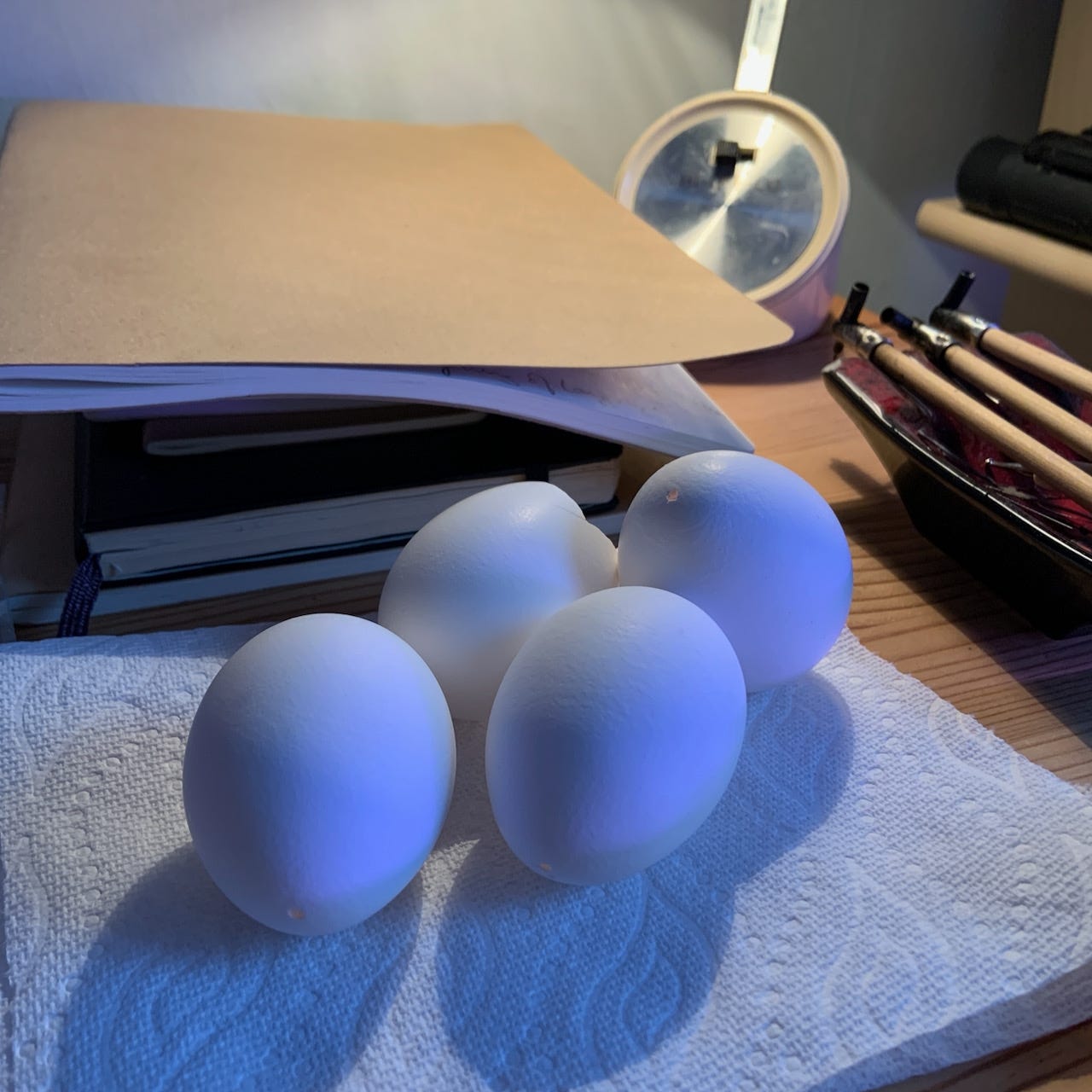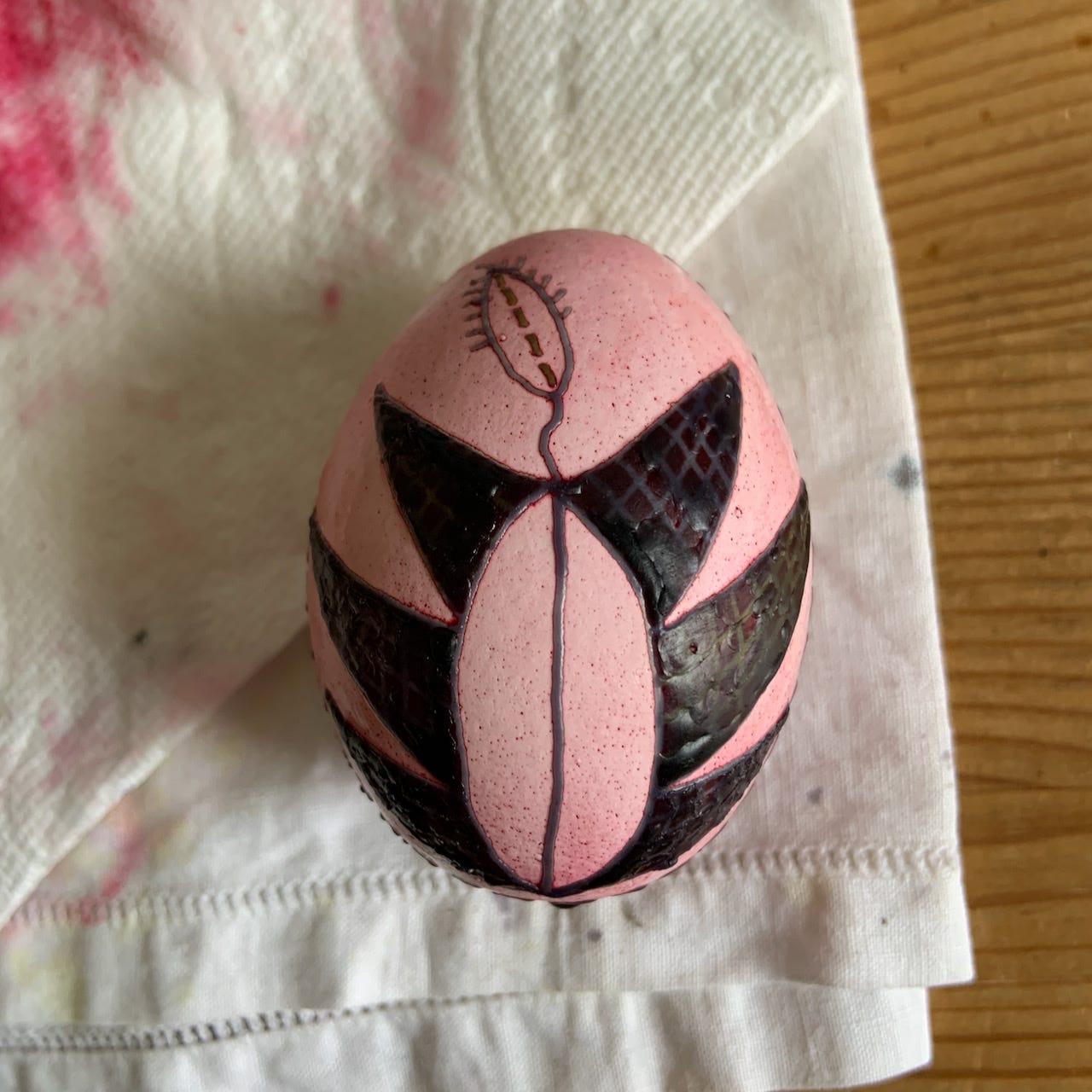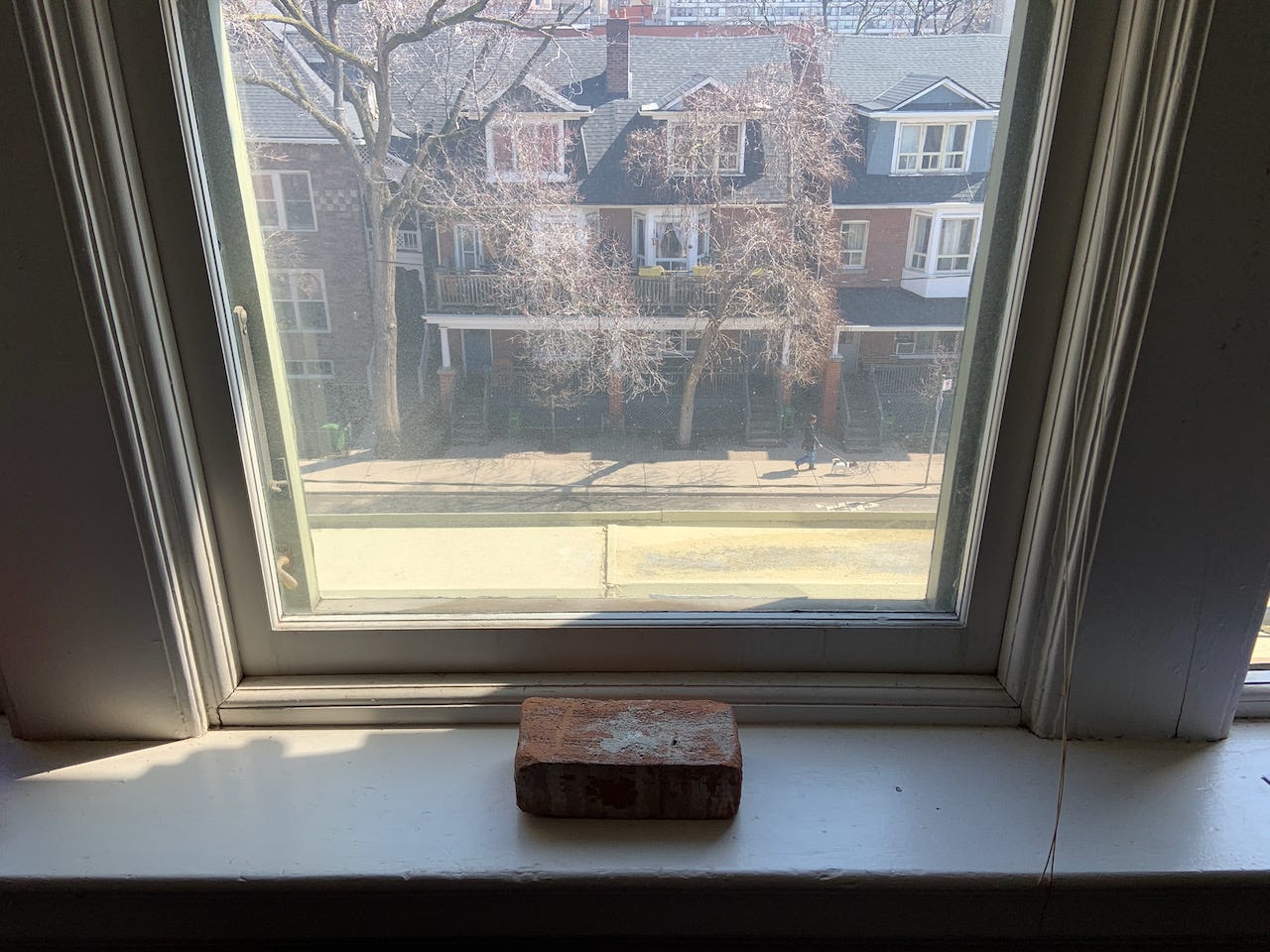1.
These days, the mind strays in all directions. Work, the world, the fragmenting day. Dragging a broom across a vast floor, making little piles. All the furniture and Christmas trees that have emerged from snowbanks, now getting hauled away. The grey leavings, the muck. Signs of spring.
A new room for Brick, and a new issue taking form. New book wandering into the world.1 New wave. New atrocities. New lines on eggshells, new trials with dyes. New sprouts, new plans for the garden.
Thoughts form, piecemeal, but how to translate them.
2.
April 2020, I was reading everything I could about the flu pandemic of 1918. It sounded just like the news, but leant a crucial, relieving bit of context. Hoarding, and campaigns against hoarding. Bigoted, false declarations about the virus’s origins and causes; called the “Spanish flu,” it likely started in military barracks in Kansas. People attending mass events, in this case to mark the end of war, and being felled in staggering numbers. Women doing so much of the tending. Poverty’s direct effect on health. And small numbers of loud people denying the virus’s existence, renouncing all measures, concocting wild, false theories. Nothing new in this world, save for our capacity to create effective vaccines. It was a strain of H1N1.
3.
I’m once again reading in search of. And I stumbled upon another encounter with the concept of pleonexia:
In June 2005, while hosting a group of American businessmen in St. Petersburg, Putin pocketed the 124-diamond Super Bowl ring of New England Patriots owner Robert Kraft. He had asked to see it, tried it on, allegedly said, “I could kill someone with this,” then stuck it in his pocket and left the room abruptly. After a flurry of articles in the U.S. press, Kraft announced a few days later that the ring had been a gift—preventing an uncomfortable situation from spiraling out of control.
In September 2005, Putin was a special guest at New York’s Solomon R. Guggenheim Museum. At one point his hosts brought out a conversation piece that another Russian guest must have given the museum: a glass replica of a Kalashnikov automatic weapon filled with vodka. This gaudy souvenir costs about $300 in Moscow. Putin nodded to one of his bodyguards, who took the glass Kalashnikov and carried it out of the room, leaving the hosts speechless.…The correct term is probably not the popularly known kleptomania, which refers to a pathological desire to possess things for which one has little use, but the more exotic pleonexia, the insatiable desire to have what rightfully belongs to others.
— Masha Gessen, The Man Without a Face
4.
“It’s only complicated when we complicate it,” said the cheery cashier, and I thought, How wrong you are, man, and how right.
5.
I stumbled upon this gravesite while visiting the Battlefords in 2008. The tipi poles were sticking up above the bush, you could see them as you walked in a diagonal line down the bank toward the Battle River, just west of the historic site. There were all these names to read, but what struck me forcibly was that these men had been hanged a mere fifteen years before my paternal grandparents arrived to homestead near Vegreville in 1900, not so far from Frog Lake. And it was when I put those two dates together, standing there in front of that gravestone, 1885 and 1900, the mass hanging, the sod-busting, I realized that our settler mythologies had never acknowledged that there was a history prior to our arrival on the land. The ceding of territory through treaty with Cree chiefs was never mentioned. Therefore, we were somehow entitled to ownership.
…
But that of course was not the enduring story that was passed down to us. The enduring story was that they were busily constructing their future in western Canada, and they carried with it these tropes of thankfulness to the government or even the queen for these free lands on which they were busting the virgin soil and building western Canada.
…
The colonialist enterprise of breaking sod was here reproduced at a feminine scale in the kitchen garden. And it was always enormous, of course, and well into the second and third generation in Ukrainian Canadian towns, the garden was a thing of wonder. You’d walk down the alleyways in places like Two Hills and marvel at what these Ukrainian Canadian gardens could produce. And it meant that there’d be always something to eat, even in the leanest days, before spring planting.
6.
Forming words is tough these days. A season of scarcity. So I read Gessen on autocracy before I fall asleep, the comfort in their chronicling. Zeroing in.
Poetry is less a help to me in times like these. What I want is an explanation. For words to be rooted to reality, for their meaning to be shared.
So many turn to poetry when the going gets rough. I turn to story.
7.
In 1984, George Orwell imagined the Party dictating its slogans: “War is peace. Freedom is slavery. Ignorance is strength.” Real-life totalitarian regimes do not grant their subjects the clarity of juxtaposing a word with its antonym—they enforce order by applying words in ways that invert meaning. The Soviet Union, for example, had something that it called “elections,” usually referred to, as though more descriptively, as the “free expression of citizen will.” The process, which was mandatory, involved showing up at the so-called polling place, receiving a pre-filled ballot—each office had one name matched to it—and depositing it in the ballot box, out in the open. The “free expression of citizen will” was not at all free, it did not constitute expression, and it had no relationship to citizenship or will. Calling this ritual either an “election” or the “free expression of citizen will” had a dual effect: it eviscerated the words “election,” “free,” “expression,” “citizen,” and “will,” and it also left the thing itself undescribed. When something cannot be described, it does not become a fact of shared reality.
— Masha Gessen, Surviving Autocracy
He doesn’t want to make sense. He wants to deprive these crucial concepts—Nazis and genocide—of any meaning, to wear them out, to make them impossible to use in a reasonable way. He wants to make it impossible for the Second World War or the Holocaust to provide any sort of general moral lessons. Words such as “genocide” or “Nazi” are to become the playthings of a postmodern dictator. They are to mean whatever he wants, and allow him to do whatever he wants….This is the style of the Putin regime: get inside the concepts and institutions that are necessary for decent public life, make a mockery of them.
8.
The sound of a plastic bag in wind is a human sound, and the one tangled for most of the winter in the ash tree outside my second-floor window gave the sense that there was someone on the other side of the glass, crouched on the porch’s awning, going through his belongings. The sound was of a human, male in my head. Betraying our poverty. The plastic bag has unhooked itself, but a vestige of the man remains in my periphery.
Hey, who’d like to write a review of Fast Commute? Send me an email; I’ll send you a review copy.









